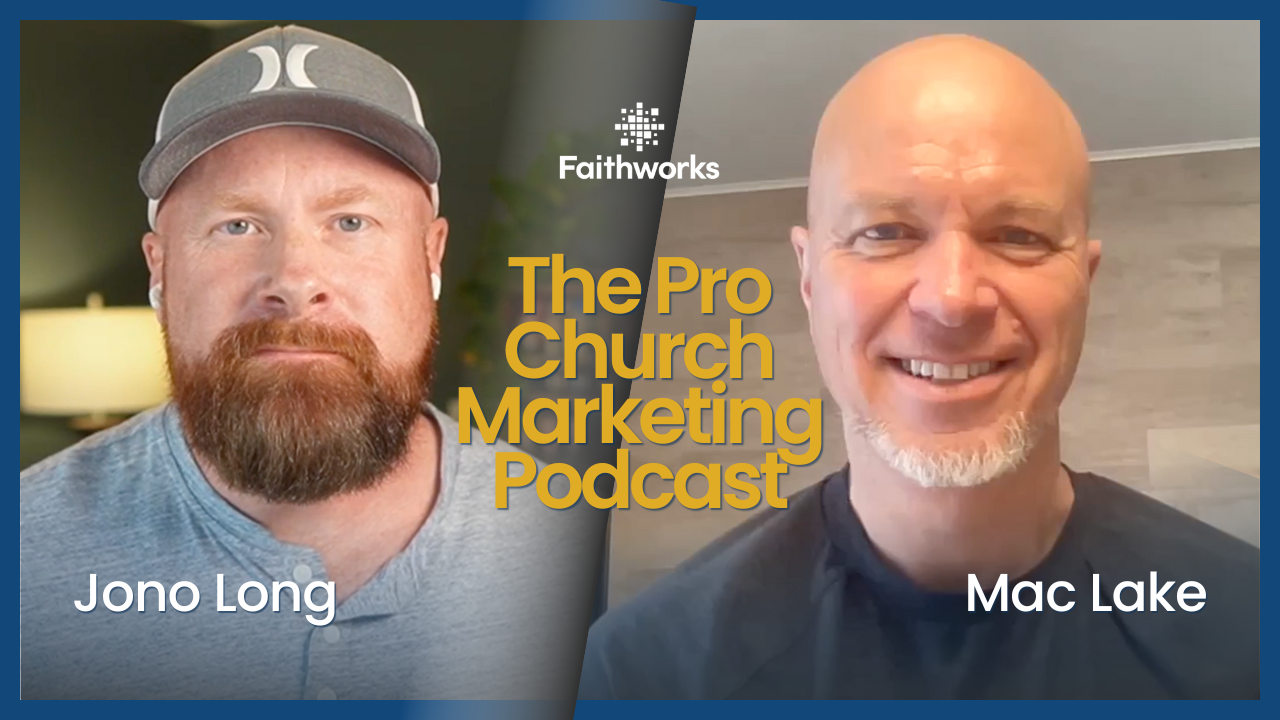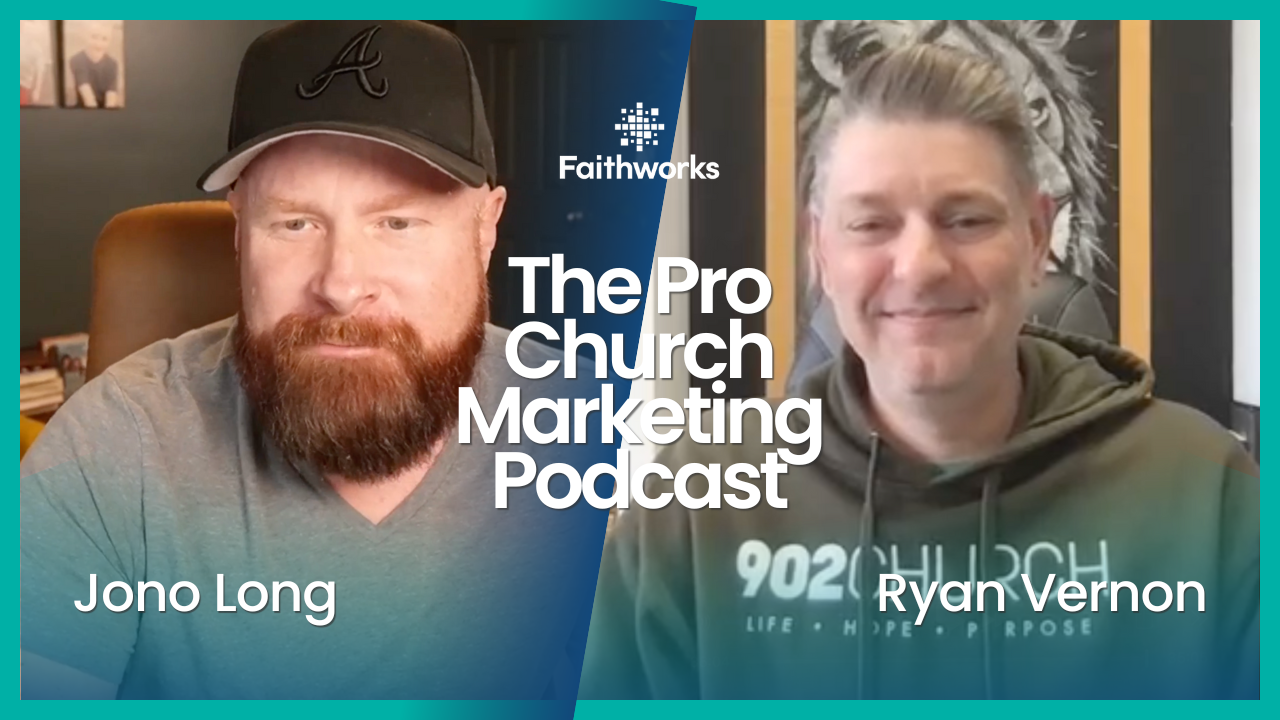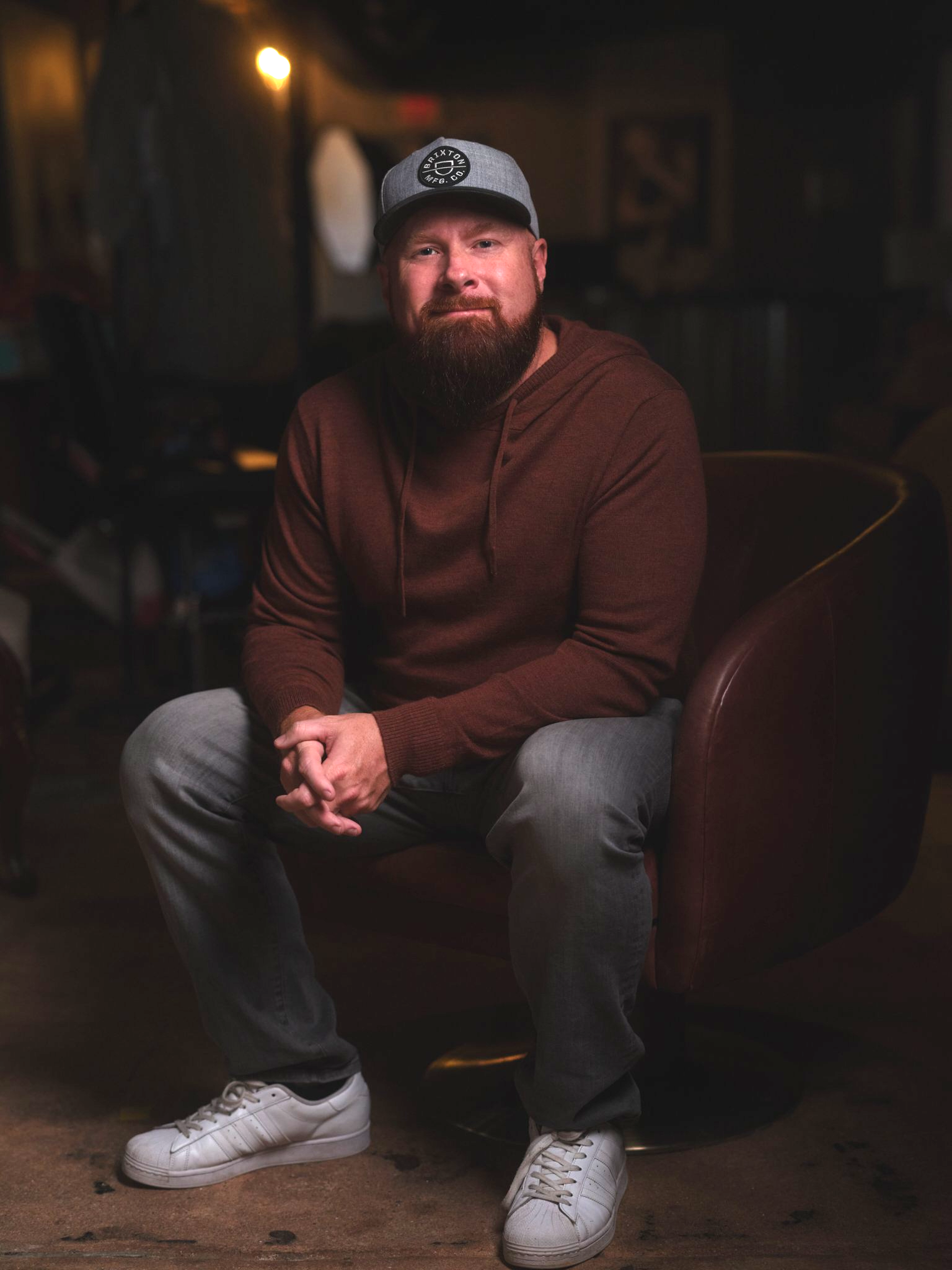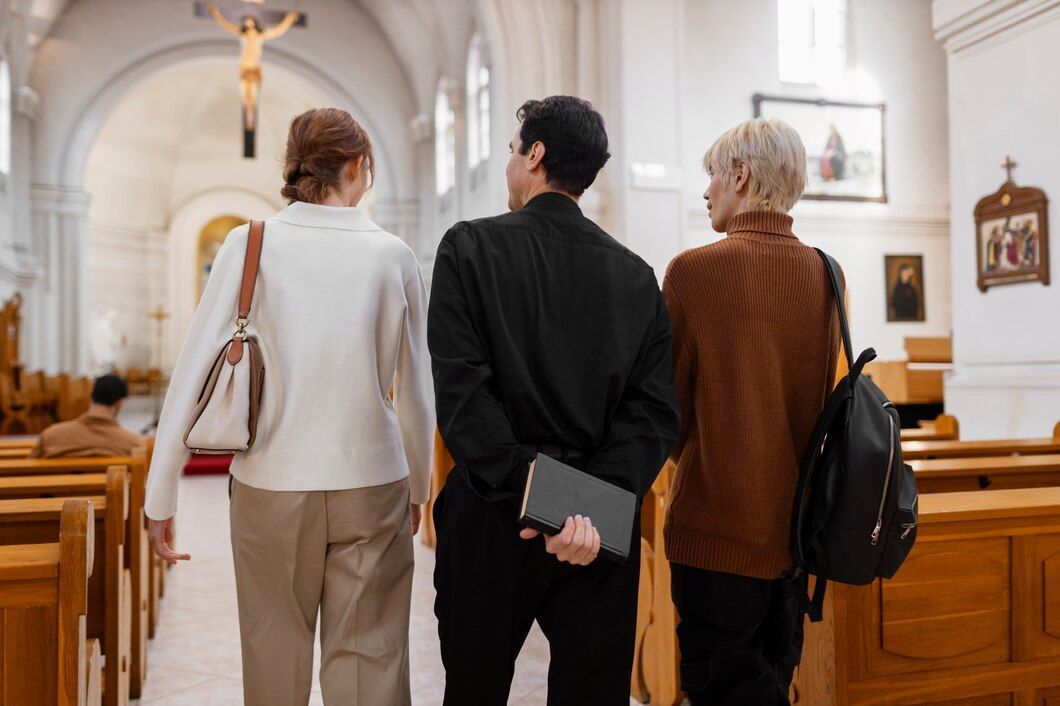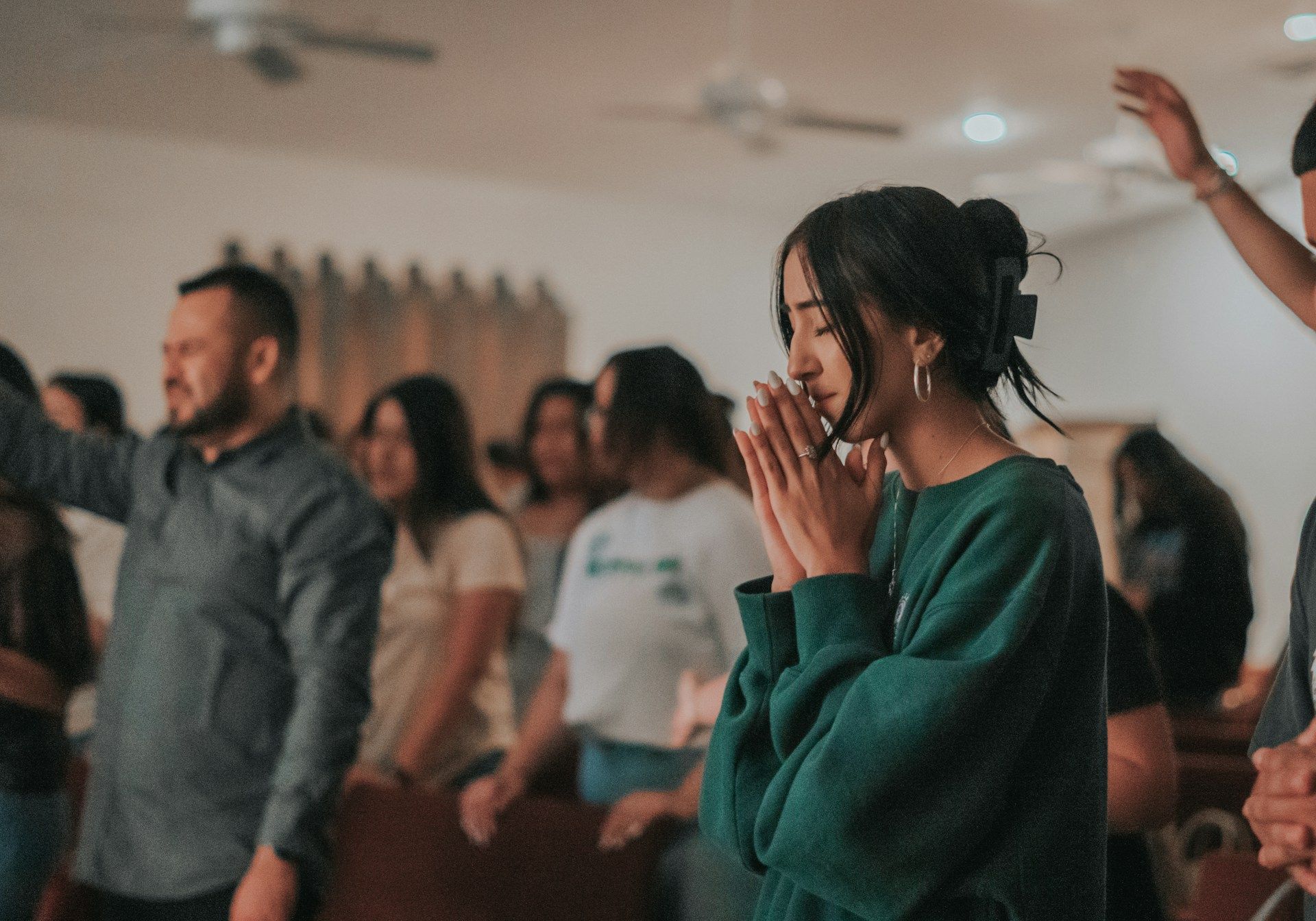Facebook Groups for Churches
WEBINAR REPLAY
TRANSCRIPT
Today we're going to be talking about Facebook Groups for your Church.
I just want to introduce myself. My name's Jono Long, actually Jonathan, but everybody calls me Jono and I'm a former youth pastor, 20 or so years of youth ministry. So, I'm a youth ministry veteran. God delivered me out of that. No, I had a great time in youth ministry. But now I work with Churches full time to help them grow by getting their online presence right. And so, we are all about helping Churches grow. And today we're going to talk about Facebook Groups. Really wanted to be helpful to you and your Church. We're going to give you some valuable content. I believe that it is valuable. So, I encourage you to, you know, take some notes, write some stuff down.
So, let's talk about Facebook Groups because I think Facebook Groups can be extremely, extremely helpful, especially for the people who are already a part of your Church.
Now, we, again at Faithworks, we're all about helping Churches grow and get new people into the Church and come to faith. But we also, want to help you grow your people once they're already there. And we believe that Facebook Groups are a great way to do it. And so really quick, just a difference between a Facebook Page and a Facebook Group.
So, some of you, you're way beyond that. And this is just, you know, kind of elementary for you. But for everybody that you may know nothing about Groups yet. So, your Facebook Page, it is really an official profile for your Church. And that's where you make your posts and people can follow you, and all that stuff. And it's pretty public, everything that goes out. I mean, most everyone's seeing it or can see it. And while a Facebook Group is a place where people can join the group. There can be discussion, they can talk about whatever's going on. They can answer each other's questions and really there's a lot of engagement.
All right, so love it or hate it. Facebook's not going anywhere. And even though their stock prices have taken a dip, and even though they've laid a bunch of people off and whatever you may think about Facebook it is growing there's over 3 billion active users every month on Facebook, which is huge.
Like half the world is on Facebook every month. And out of those 3 billion, 2 billion of them every month are using and actively engaging in a Facebook Group. So that tells me that, you know, Facebook Groups are important. They don't need to be ignored. I was looking through yesterday, looking at some Churches who are doing a great job with Facebook Groups. And it was actually pretty impressive. And then there's a lot of Churches, obviously who just haven't jumped into the Facebook Group world. So, I want to encourage you and there's probably some hesitations, but I want to encourage you that, you know, posting on your Facebook Page isn't enough.
And you probably already know that. You're probably already feeling that. You can't depend on your Facebook Page to get the word out about things that are going on in your Church. I hear this frustration from Church leaders. I experienced this. We would make a post on social media that, Hey, this has been canceled or time has been changed, or, Hey, this event is going on or we need volunteers for this.
And inevitably there was always several people who didn't get the word that the time had changed for the event they showed up at the wrong time. Or, you know, a week later you've got an angry parent or an angry member saying, Hey, I wish someone would've told me that this was going on. I would've loved to be a part of it.
And then you're thinking, well, I posted about it on Facebook, but what you didn't realize, is that the reach of a good Facebook post is only about 9 or 10%. So even the best post is only going to show up to about 9 or 10% of the people who follow your page. So, if you've got a thousand people who have liked your page or they've followed your Church's page and you go do this post about, Hey, we've got a special event this weekend or we're signing up for small groups.
You're lucky if a hundred people even see that post out of the 1000 who are following your page. And so, the Facebook Page is not enough. And the cool thing about the Facebook Groups is engagement is much, much higher, 50 to 60 to even 70%. People who are in your group are going to see these posts.
And if you can get them to turn on notifications like they need to, it's going to go up even higher. And one of the cool things about groups is it gives you a way to interact. So, it's not just like a page pushing out information. Hey, this is going on or, Hey we, we had this event or, Hey, here's a picture of last Wednesday night or Hey, whatever, it allows for interaction, and it allows for engagement. And it's cool because you know, one of the struggles of any Church is that we're together for a couple of hours on Sunday. And maybe if you've got a midweek service or you've got community groups throughout the week, maybe that's another hour or two, but out of the entire week, we're only engaging two or three hours, four hours max.
And so, when you bring a Facebook Group into the equation, now you've got an opportunity for the leadership of your Church, for your Church congregation to engage with each other daily. You as the leader, or you as the youth pastor, you as the pastor, you as the whoever on the Church staff, the small group leader, whoever you are, you've got an opportunity to engage with your Church with the people in your Church every day, if you want to.
Which brings up possibly a hesitation because you're already thinking, well, I don't have time. It's, it's hard enough for us to get Facebook posts. I've got a sermon to write. I've got stuff to do. I've got committee meetings; I've got a service to plan.
And so, to add another thing to worry about is, I get it not very appealing. And there's other hesitations, you know, what, if it gets out of control, what if everybody gets in there and starts arguing about politics or what if everybody gets in there and starts having just crazy discussions and all they want to talk about is like the end times and the apocalypse? What if it just gets out of hand? So, you're afraid because you don't have time. You don't really want to police it. But I want to say that if you get it going. And you do it right. You can get to a place where you can almost allow it to be on autopilot, as long as you set up some boundaries and, and create a culture inside of a group.
And once you do those things, once you create that culture and let everybody know here's what their group's going to be about. Here's what's okay. Here's what's not okay. And set some rules, set, some boundaries, set some ground rules. Then it'll tend to self-moderate. And so, we want to think of the Facebook Page, kind of like a sign out front. It's really not much more than a sign that about 10% of the people who pass by it read and soak it in. Then we can think about the Facebook Group as more of the living room. This is the place where you can have a conversation around a topic. You can explore it in detail. You've got an atmosphere; you've got an environment that really emphasizes some dialogue and engaging with each other and some good conversation.
So, here's some practical things. I suggest that every Church, whether you are a Church of 50 people or 20 people, I think it's especially good for a smaller Church to have a Facebook Group. You may be thinking, well, I've only got a hundred people, you know, what if only 20 people come in the group and it may not be good, I'm telling you it it's going to be better than you think.
If you've got 3000 people that are a part of your Church, I think a Facebook Group is great. And depending on the size of your Church, that's where maybe you can have different groups for different areas of the Church. And we'll talk about that in just a second. I encourage you to set up a group and you can just go to facebook.com/groups or even on your Facebook profile, you can click on Groups and Facebook makes it very easy to set up a group.
But I do encourage you to really read the questions that they ask. Don't just start clicking and try to get through it in a hurry because there's some settings you need to pay attention to. And so, I suggest when you're creating this group that you set the group to private, so that only the people who join will be able to see the content that you post, and the discussion is going on.
This makes the group a little more exclusive. Gives people a reason to actually join so they can access the content, which brings up another point. You don't want to just send your content that you're posting on your Facebook Page into the group. And that's all that ever goes into the group, because then what's the point of joining the group? In people's minds, they don't really need to join the group. So, there's got to be content. We've got to think of that page, the Facebook Page, really more about people who aren't at our Church yet are, and who are kind of kicking the tires, checking things out. And that Facebook Group is really the place where people who are already here, already engaged and involved in our Church, that's the place they go to get their information and to ask questions and to, you know, just check on people to maybe even ask for help, to ask for prayer. That sort of thing. So, I think it's a good idea to make those groups private. You can't typically share things from a group, you know, if there's a group post inside the group, you can't share that to your personal profile.
So that makes it a little bit more private. But it doesn't just facilitate community. I mean, a Facebook group is a great way to build community, get conversation, get people, to meet each other that don't already know each other. It's like maybe they pass in the halls at Church, and they would recognize each other if they ran into each other at the grocery store.
But they've never really talked. They've never engaged. They don't know anything about each other, but sometimes inside that Facebook Group, they get in on a thread, they get in on a discussion and find out, I actually like this person and who knows what can come from that. This is one of the best ways to enhance your Church communication.
If you're constantly frustrated by people not knowing what's going on. I used to do the announcements at our Church and so, on Sunday morning, I'm getting hit up to do, you know, Hey, could you announce my small group? Hey, could you announce the women's ministry thing?
And if you don't control that, pretty soon, you've got a list of 27 announcements, and no one wants to sit through 27 announcements on Sunday morning. So, this is a great place to all those things that you can't really talk about from stage. You know, and I know that really the all call from stage, especially if you're like asking for volunteers.
The stage is really the worst place to do that. But Facebook Group, that's the perfect place to communicate some of those things that you don't really want to throw out on the Facebook Page because no one's going to see it. And because the Facebook Page, you don't want people who aren't at your Church yet seeing. There's some things we're just not sharing with everybody.
Whether it may be like, Hey, it's a budget meeting. All the boring stuff that we don't really want to throw out there because that's just not of interest to people who aren't a part of our Church, but the Facebook Group is a place for doing that. You can really enhance your communications.
I see a lot of Churches who have, I think the intention was there and the intention was to create something that was ministry area specific.
And when they really needed a group, what they actually did was go out and create another Facebook Page. And then you end up shooting yourself in the foot, because if we create a different page for every ministry in the Church, the reach is going to be low. You know, let's say you've got a thousand people following the main Facebook Page for your Church.
And now you go create a Facebook Page for the children's ministry. You may get a couple hundred people to come follow that page. And now remember that whole 9, 10% rule? We're lucky if when you do a post on that children's ministry Facebook Page or the men's ministry or women's ministry or outreach or homeless ministry, whatever it is now only 20 people or so are seeing that post and it's appearing on their newsfeed.
And so, all we've done by creating that ministry specific page, is watered down and squashed our reach even further than it was. So, I suggest that if it's something that you want everyone to know about, it's a community event, push that on the main page and not have a bunch of different pages for every ministry, every organization inside of the Church. Don't create those pages.
It is probably a good idea for them to have like their own Instagram account and the youth group, if they want to have their TikTok account, if you're cool with that, then yeah. Have your own Instagram account, whatever. But probably in most cases you really only need one Facebook Page, but then if you've got a large Church, then maybe it is appropriate, where you start creating some groups. But the first thing that we need to create is really just that catchall group for your Church. So, consider creating that catchall group for the entire Church. This is a place where you can encourage Churchwide conversations for everybody who considers your Church, their spiritual home.
This is where you can engage directly with the Church family. Maybe that's even what you call it. This is our Church Family Group. My Church is the name is Journey. So, Journey Church Family, that's the Facebook Group. This is where prayer requests can go. Updates on Church events, announcements, explanations about upcoming projects. You know, we're collecting book bags for back to school, whatever that is that internal communication, because people who see your Facebook Page who are just kind of checking you out, you don't want to be asking them necessarily to donate or, Hey, we're raising money for this. We're doing a capital campaign and that's just not stuff you necessarily want to throw out on the Facebook Page. The group is the perfect place for that. Volunteers, like we're looking for volunteers for these events.
We're looking for greeters. We're looking for people to cook, we're looking for youth workers. We're looking for small group leaders. Again, not something you necessarily want to throw out on the page. Mainly because most people aren't going to see it. The people you want to see it are probably not going to see it, but perfect for a Facebook Group.
Really anything that you want to communicate with the Church that you really wouldn't necessarily want to put on the Facebook Page or even on the Church website, the group is the place for that. Now, if you're in a larger Church or maybe if you're even not in a larger Church, affinity groups or just specific, you know, groups for different divisions of different ministry areas in your Church, to start up a mom's Facebook Group, a men's ministry Facebook Group, a women's ministry Facebook Group, a group for parents of teenagers, a group for parents of elementary age kids. Those are some really good ways to start some groups, some really good ideas to start some groups. We did something when I was youth pastor.
We started a resource group at our Church because we liked to do big events. We liked to do, you know, big weekend retreats. And we always kind of went all out on these things and decorated. And so, we ended up creating a resource group and inviting people who, just had stuff. Guys who were construction workers and they had a lot of tools.
We started there and then the group members started inviting other group members, because they know that that person is resourceful. And so, we just ended up with this hodgepodge of people who were resourceful people and had a lot of stuff or skills and talents and abilities.
So anytime we needed something like, Hey, we're decorating for this event. Who's got, you know, some spare lumber sitting around the house? And one of them, Oh, I've got some leftover wood from where we rebuilt our deck. How much do you need? We ended up with people in there who like, we found out they had a boat.
We didn't know they had a boat, but they throw it out there. We're like, Hey, does anybody have a boat? We want to take the teenagers, you know, tubing. And somebody's like, yeah, I got a boat. I got a cabin for your staff retreat. I've got a lake house for your student retreat. And so that resource group, we ended up with a lot of resources, a lot of opportunities that we didn't even know existed inside the Church that we were able to dig up and discover. And so, it turned out to be a really cool thing.
Now let's talk about how to grow the group really quick and this is pretty easy, but you got to be consistent. You got to keep it out in front of people. First you can invite people who like your Facebook Page already. So go do a few posts saying, Hey, if you want to be in the loop on the inside stuff, if you're a part of the Church family, then go join the Facebook Group.
Put a link on your website, make a blurb on your website. Join the Facebook Group, especially on those internal pages like student ministry and children's ministry and things like that. Maybe not at the top of the homepage. Hey, join our Facebook Group. But the pages where the calendar page, you know, the events page, that's a good place to point people to the Facebook Group so they can get real live updates, especially if you're bad about keeping your website up to date, right? Put a link in your email signature. We have a Facebook Group, Pro Church Marketing and in my email signature, it says, Hey, come join me in our Pro Church Marketing Facebook Group, and you click on it it'll take you directly to the group to join. And so put in your email signature. Do some giveaways. Incentivize them. You can do some giveaways, you know, on Sunday morning, say, Hey in our Church Family Facebook Group, we're going to be giving away a Chick-fil-A gift card on Wednesday.
So, make sure you join the group by Wednesday. And everybody who's in the group by Wednesday, we're going to randomly pick someone and give you a Chick-fil-A gift card. And I guarantee you'll see some results from that. You could also do a post. You can't create an ad, advertising your Facebook Group. But what you can't do is create a post with a link to the Facebook Group saying, Hey, come join our group, and then you could boost that post. Boost it for 20, 25 bucks. Pick your audience as people who like your page and just boost that post to get it in front of people who already like your page, because there's a good chance that if they liked your page a lot of them are a part of the Church.
And so that's some practical ways to grow the group. Now, as the group's growing once you've got them in there, now it's time to engage the group. Remember engagement on Facebook has gone way down. Facebook wants to blame it on TikTok. But one of the places on Facebook that really hasn't suffered and actually engagement has gone up is Facebook Groups.
And Facebook knows this, and they're putting a lot of resources behind improving groups and groups are changing all the time and they're getting better and better and better. And so just a little more reason to start a Facebook Group. But one of the other things that you can do, what I would encourage you is just create a simple plan for some weekly posting inside the group and stick with it.
Go ahead and schedule it out on your calendar. And I know this is where you're thinking. Yeah. Oh, great. One more thing to do. As if posting on Facebook, wasn't already stressful enough. Thanks. I needed another chore. So maybe this is where you pull in some volunteers. This is where you assign this to a staff member.
I'm not saying you have to do it, but somebody needs to do this. And so, if you begin using Facebook in these ways, I think you're going to find a lot of engagement from people who really want to be a part of the conversation they're interested. Maybe they're shy. They're not going to come ask you questions on Sunday morning.
They don't really want to pull the pastor aside but get them in the Facebook Group. Then you can engage with them. And like I said, don't just throw the Facebook posts from your page. Don't just copy and paste those into the group. Put some unique content in there. Maybe Monday is, Hey, what are we praying for this week? Who needs prayer? What are some prayer requests? Maybe Wednesday is you posting about events that are going on in the community, whether it's events that you're planning. Like I know tomorrow night for our Church, we're kicking off our kids' ministry for the fall semester.
And so that's a good place to announce that Kids Life, is what we call it, is cranking up on Wednesday night. Friday, you can give a little snapshot of what's coming for Sunday. So maybe you as the pastor, you give a little snapshot of the message. The worship leader can say, Hey, here's some songs we're doing Sunday.
Maybe you can go ahead and be listening to them this weekend. So, you're ready to worship with us on Sunday morning and give them just a little glimpse of what they've got to look forward to on Sunday. I saw a Church, they were doing a pretty cool, they put their staff birthdays in there.
And so, the Church is just, you know, loving on their Church, staff members. Asking good questions inside the group really sets the culture. This is back to the whole moderation thing, when you set the culture and you let everybody know what the group is about, this is where we're going to share prayer requests.
This is we're going to encourage each other. This is we're going to let you know what's going on. This is where we're going to celebrate our staff. We're going to celebrate wins in our Church. We're going to celebrate baptisms. We're going to ask good questions but we're not going to debate theology all the time.
We're not going to debate predestination or something like that. We're not going to talk about politics. When you create those and the community begins to develop, you know, it's going to take care of itself. They're going to answer each other's questions and this group's really going to generate its own content.
And then you don't have to be so strict and disciplined and even posting because a lot of it is going to take care of itself. Now here's something that I would encourage you to do. As one of the leaders, maybe the pastor or someone in leadership in the Church is to once a week go live for a few minutes, two, three minutes.
Whether it be just an encouragement, a short devotional, a glimpse of what's coming this Sunday. I would get into this rhythm of every Thursday at 2, we go live in the Facebook Group or every Wednesday night we go live in the Facebook Group. Just so that people know that this day and time the Facebook Group goes live.
So, people begin to just remember that that's the time. So, people actually watch and engage. I think that's a great idea. You can just use your phone. It doesn't have to be fancy. If you want to get fancy with a nice camera there's programs, you can download like ecamm.com.
It's kind of a streaming platform where you can bring in guests and interview someone. It's where you can do the whole lower thirds thing, you know, kind of have some titles in there. Fancy schmancy it up a little bit, but you don't have to do that.
The other thing is that at first, there may be no one watching the live. When you go live on Facebook, no one may watch it at all. It may take some time, but you've got to be consistent. Keep doing it push through. And even if no one watches then, that doesn't mean someone's not going to watch that video later because that video is going to live in the group.
It's going to live in your videos there on Facebook. It's not just going to disappear. And so, there's going to be some value. It's going to get some views. So don't be discouraged if, when you're live, you know, one person pops in and then pops out and no one's there. I know it's easy to get discouraged there I've been in those situations where the last Facebook live, I did, I think there was like one person who watched and it may have been my mom, I don't know. But don't get discouraged. Keep doing it. Push through. Because that video is going to provide some value to someone. So, I think going live is a really great idea. Now, another thing you could do, and this is where we're shifting to, you've got to moderate the group.
You can't just set it and forget it because it could get out of hand. People could start arguing about politics. So, if you don't set it up properly and communicate the purpose, then it can get out of hand. And so that may be a hesitation of yours and you're thinking I don't want to police it. I don't want to have to police something else.
And I want to say that you don't need to be just a policeman in this group. But maybe you do need to get a few trusted volunteers and assign them as moderators, give them that level of access inside the group setting so that they can remove comments of somebody, just chimes in something that's really a little bit, you know, out of hand or whatever. But what you want to do is again, if you ask those great questions and you set the boundaries and when you set that group to private and when people are joining the group, you can ask questions where they have to answer certain questions before you even let them in the group.
That's probably a good idea, it gives you a little bit of control there. I think that's important and something that you want to do and set it up properly that way. Get some help, every week, ask some great questions and I would say encourage people in the way that you want them to behave.
Commenting and engaging with their posts. If someone is sharing a prayer request or they're celebrating something then go comment on that and say, Oh, this is great. This is awesome. So excited for you and reward that. Or just encourage that behavior by engaging with it. And you'll create that culture that really is encouraging.
The last thing that I want to mention to you, is just the notifications. Because part of the engagement is making sure that people get notified when there's a new post in the group, or when you go live in the group and Facebook has made some changes recently. You may be a part of a bunch of different groups. I'm a part of, I don't know how many Facebook Groups, some of them, I check on a lot, but there's about six that I have gone in and customized the notifications because I don't want to miss anything that goes on in those groups. So, where I'm a member of about 30 groups, there's about six or seven that I really care about, really pay attention to.
So, what I've done is, because Facebook just changed some of the notifications to whereby default your notifications are going to be highlights. What that means is Facebook is going to decide what notifications it thinks that you want. And so, it's going to notify you of posts that Facebook thinks you may find interesting, and they may get it right sometimes, but you're going to miss a lot.
And if you're a part of a lot of Facebook Groups, you were getting a lot of notifications and now it's probably dawning on you that, well, I'm not seeing as many notifications as I was seeing one time. So, the reason for this is because Facebook changed the default notifications and they're all on highlights where, like I said, Facebook's deciding what you're going to get notified about.
So what I would encourage you to do is either pin a post at the top, or when you invite people to be a part of the group or somehow communicate that they need to go to their groups and click on the group and click the little gear up there and under notifications select, instead of highlights, click on all posts so that they get a notification about all the posts that happened there and that way they're not missing anything. And so, they're not going to come to you on Sunday morning. I wish somebody had told me about the Chili Cookoff. I wish somebody had told me about the outreach. I wish somebody had told me that youth group wasn't meeting this week.
So, if you get their notifications all cleared up and all straightened out and make sure they're notified about everything and as long as they don't get annoyed and change it. Then you're going to be in good shape. People are going to hear about what you've got going on. People are going to engage with each other.
It's going to self-generate content. People are going to feel more connected. You're going to have that opportunity to engage with people throughout the week, rather than just on Sunday and Wednesday. I really think it's going to be a huge benefit to your Church. So, I hope you found this helpful.
I would love for you to join our Facebook Group. It's facebook.com/groups/prochurchmarketing or you can just go search Pro Church Marketing, you'll find it. Join the group. We're putting videos in there. We're throwing out stuff that's just helpful for Church leaders when it comes to not just marketing, but we talk about worship leading, we talk about youth ministry, all kinds of stuff in there. That really just to be a blessing, to be a help to your Church.
So, thanks so much for being a part of this. Thanks for watching and thanks for listening and thanks for being here. And so, we appreciate you. And if there's anything that I can do to help you with your Church, don't hesitate to reach out, would love to talk to you, and I promise not to give you a sales pitch. I'll just answer any questions you have and help you out as much as we possibly can. So have a great day. God bless you and we'll see you next time.
Latest Posts
